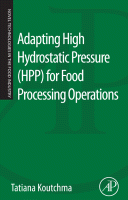Browse content
Table of contents
Actions for selected chapters
- Full text access
- Book chapterAbstract only
Chapter 1 - Introduction
Pages 1-3 - Book chapterAbstract only
Chapter 2 - Fundamentals of HPP Technology
Pages 5-10 - Book chapterAbstract only
Chapter 3 - In-Container HPP Principle
Pages 11-14 - Book chapterAbstract only
Chapter 4 - HPP Cycles
Pages 15-22 - Book chapterAbstract only
Chapter 5 - HPP Microbial Effects in Foods
Pages 23-28 - Book chapterAbstract only
Chapter 6 - Emerged HPP Commercial Applications
Pages 29-34 - Book chapterAbstract only
Chapter 7 - Emerging Applications
Pages 35-39 - Book chapterAbstract only
Chapter 8 - HPP Commercial and Pilot Equipment
Pages 41-56 - Book chapterAbstract only
Chapter 9 - Regulatory Status Update
Pages 57-61 - Book chapterNo access
Chapter 10 - Conclusions
Pages 63-64 - Book chapterNo access
References
Pages 65-67
About the book
Description
Adapting High Hydrostatic Pressure (HPP) for Food Processing Operations presents commercial benefits of HPP technology for specific processing operations in the food industry, including raw and ready-to-eat (RTE) meat processing, dairy and seafood products, drinks and beverages, and other emerging processes.
The book presents high hydrostatic pressure processing (HPP) for treatment of different groups of raw and finished products, focusing on specific pressure-induced effects that will lead to different biological impacts, and the information necessary for specifying HPP process and equipment. It also discusses phenomena of compression heating, the HPP in-container principle, requirements for plastic materials, factors affecting efficacy of HPP treatments, and available commercial systems. Additionally, the book provides updated information on the regulatory status of HPP technology around the world.
This book is an ideal concise resource for food process engineers, food technologists, product developers, federal and state regulators, equipment manufacturers, graduate students, and educators involved in research and development.
Adapting High Hydrostatic Pressure (HPP) for Food Processing Operations presents commercial benefits of HPP technology for specific processing operations in the food industry, including raw and ready-to-eat (RTE) meat processing, dairy and seafood products, drinks and beverages, and other emerging processes.
The book presents high hydrostatic pressure processing (HPP) for treatment of different groups of raw and finished products, focusing on specific pressure-induced effects that will lead to different biological impacts, and the information necessary for specifying HPP process and equipment. It also discusses phenomena of compression heating, the HPP in-container principle, requirements for plastic materials, factors affecting efficacy of HPP treatments, and available commercial systems. Additionally, the book provides updated information on the regulatory status of HPP technology around the world.
This book is an ideal concise resource for food process engineers, food technologists, product developers, federal and state regulators, equipment manufacturers, graduate students, and educators involved in research and development.
Key Features
- Includes case studies for HPP treatment of commercially produced foods with information regarding different HPP processing equipment
- Gives examples of specific applications for meat and poultry products treatments, fresh juices and beverages, and seafood
- Covers energy savings, environmental aspects of HPP technology, and regulatory status
- Includes case studies for HPP treatment of commercially produced foods with information regarding different HPP processing equipment
- Gives examples of specific applications for meat and poultry products treatments, fresh juices and beverages, and seafood
- Covers energy savings, environmental aspects of HPP technology, and regulatory status
Details
ISBN
978-0-12-420091-3
Language
English
Published
2014
Copyright
Copyright © 2014 Elsevier Inc. All rights reserved.
Imprint
Academic Press
